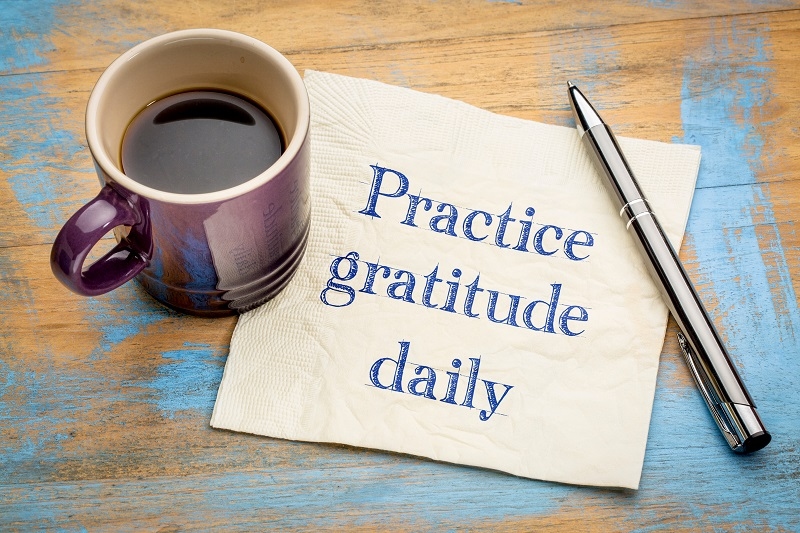
In the midst of work stress, headlines, and the never-ending scroll of social media, the best of life is easy to forget. Our minds are stuck in loops of concern, comparison, and busyness, leaving little room for happiness. What if the key to greater happiness and peace is not doing more but paying attention more?
That's where a daily gratitude practice comes in—a small but powerful habit with the power to create seismic shifts in how we inhabit the world. If you're stuck, panicked, or just desiring more emotional clarity, adding gratitude to your morning routine could be just the mental reboot you've been looking for.
Let's go a little deeper into what gratitude is all about, how it shifts your thoughts, and the top daily gratitude practice recommendations that you can start using right now.
Gratitude takes more than just saying thank you. It's a practice—a day-to-day practice of noticing and valuing the good, regardless of how awful things might appear. Practiced regularly, it trains the brain for an abundance mindset over lack, quiets inner critique, and lays the groundwork for clarity and emotional balance.
Study proves that gratitude practitioners experience an increase in dopamine and serotonin—brain "feel-good" hormones. And focusing on gratitude leads to increased concentration, greater emotional control, and deeper relationships.
It's not magic, it's mind. And the best part? It doesn't require a drastic life change, expensive gear, or hours of free time. Several simple habits done consistently can radically shift your perspective.
When you are thankful, your mind works differently. Neuroscience tells us that thankfulness activates the prefrontal cortex—the brain area that makes decisions and thinks clearly. At the same time, it suppresses activity in the amygdala, the brain's fear center. You become less reactive, less fearful, and more grounded.
That's the psychology of clarity of mind with gratitude. Gratitude creates distance between you and your stress. Gratitude provides perspective. Employed daily, gratitude simplifies your mind and keeps you focused on what's most important.
Imagine starting your day not with stress over your overflowing inbox but with thankfulness for the sunrise, your coffee, or a good friend. That's not a pleasant sentiment—it makes you more productive, compassionate, and peaceful.
So how do you progress from good intentions to a habit that lasts? These daily tips for practicing gratitude are designed to be easy, adaptable, and powerful in real life.
Bookend your day with a moment of appreciation. In the morning, think of one thing you’re looking forward to. At night, recall three things you’re thankful for. This small ritual takes less than five minutes but can dramatically shift your mood and mindset.
Whether with or without someone, speaking your gratitude makes it more tangible. Say "I'm really appreciative of this quiet time," or "I'm grateful we made it through today together." Saying your gratitude adds weight and strengthens the sensation.
Place a sticky note on your bathroom mirror or a gentle reminder on your phone: "What are you thankful for today?" Visual cues prompt your brain to pause and reflect, making gratitude an everyday reference point.
Weave simple rituals of gratitude into daily habits. Think of something you are thankful for as you brush your teeth or make your coffee. Gratitude is not about finding an extra time slot—merely a conscious attitude.
Gratitude is not the opposite of difficulties. In fact, seeing difficulties while gazing at the bright side is perhaps the strongest daily practice suggestion for a gratitude journal. Ask yourself: "What did I learn through this?" or "Who supported me through this?"

One of the most effective and sustainable habits to form is a gratitude journal. If you are wondering how to start a gratitude journal, it is simpler than you think—and the rewards can be huge.
Gratitude doesn't mean a 30-minute daily journaling session or a weekend retreat. If you're pressed for time or get easily overpowered, here are some simple little gratitude rituals even the most hectic schedules can fit in:
Gratitude Walks: When you take a walk—perhaps to the mailbox or around the block—mentally check over five things you're thankful for in your life or surroundings.
Grateful Breaths: Before eating, take a deep breath and think about something that nourished you that day (a compliment, a good meal, a success).
Thankful Texts: Once a week, send a text of gratitude to someone thanking them for something specific they did or the role they fill in your life.
Mindful Mornings: While sipping your morning coffee or tea, take a moment to be fully present. What are three things you’re glad to wake up to today?
These simple gratitude rituals don’t require extra time—they just ask for intention. And that intention becomes the foundation for joy and clarity.
The more often you practice gratitude, the more it reconditions your brain. It's similar to how muscle mass in the gym is a function of small repeated actions adding up over time. The payoffs of everyday gratitude go far beyond mood boosting; they spread throughout life:
Emotional Strength: You bounce back from adversity faster because you possess an inner reserve of positive memories and emotions.
Improved Relationships: Expressing thanks makes relationships stronger. Others feel seen, valued, and closer.
Self-Awareness: You're more tuned in to your needs, desires, and triggers—because your focus is inward with kindness.
Peace of Mind: Worrisome concern dissolves when you focus on what's already good. That's the solution to mental clarity through appreciation.
The trick isn't waiting for the "perfect" opportunity. Gratitude isn't something you're owed—it's something you practice. And the more you practice, the more it comes naturally.
Gratitude doesn't require you to have a perfect life. In fact, it thrives best when life is messy. It causes you to notice the warm hug on a difficult day, the hand that held the door open for you, or the way your dog wags its tail as if it's the best part of the day.
Building an appreciation practice does take some up-front effort—but it's worth it in ways any app or book on productivity or personal growth simply can't compete with. Wherever you're at—starting to learn about starting a gratitude journal, looking for simple rituals of appreciation, or finding mental clarity through thankfulness—remember: gratitude is a muscle. The more you use it, the stronger and second-nature it will grow.
So the next time life is blurry or overwhelming, take a minute and look in the mirror and say, "What can I be grateful for right now?" That little question might be your biggest transformation
This content was created by AI